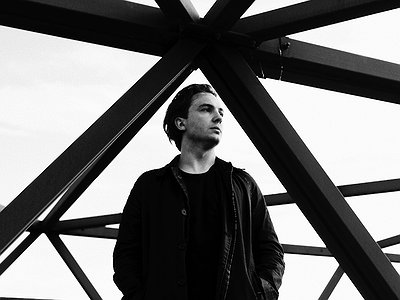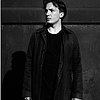Could you describe your creative process on the basis of a piece or album that's particularly dear to you, please? Where did the ideas come from, how were they transformed in your mind, what did you start with and how do you refine these beginnings into the finished work of art?
Actually, during the making of ‘Ophold’ I was more inspired by literature than music. My creative process started out being based upon the philosophical idea of a mental ‘Cesura’ by Immanuel Kant. Deeply inspired by this, I went to a sensory deprivation tank in Copenhagen together with a dancer when we did research for a project and while I was there, floating in the water, deprived of most of my senses, I got the idea to use the concept of a mental caesura as a guideline for my music. To emulate the feeling of not knowing, I invited musicians to join me and improvise freely. I would only guide them when needed. In this way, I could shape the music without knowing how beforehand.
There are many descriptions of the ideal state of mind for being creative. What is it like for you? What supports this ideal state of mind and what are distractions? Are there strategies to enter into this state more easily?
I really found out through the process of creating ‘Ophold’ what kind of conditions helped clear the way for my creativity. First of all, having great opportunities of recording and experimenting was essential.
Then I also left the result completely open and decided not to define my sound beforehand. This led to so many interesting recordings to choose from. I collaborated with musicians that I really respect a lot and wanted to work more with. It inspired me to work with these amazing people and through their beautiful improvisations, it took my creative ideas way beyond what I ever could have made on my own. The time frame was also left open and I continued to work on the music until one evening when I suddenly stopped and got the feeling that nothing more should be done. It was actually quite weird, because at that point, I was actually expecting to stay in the studio for a couple of months more, but this feeling made me so sure that I couldn’t do more for the music, so I decided to export the music and go home.
How is playing live and writing music in the studio connected? What do you achieve and draw from each experience personally? How do you see the relationship between improvisation and composition in this regard?
I gleaned a lot of my composition and production methods from studying improvisation on the drum set and as ensembles through the years. I recently improvised with microphone movements while recording and we jammed on the tape machine in the mixing process. I made sure the mixing followed the concept of both recording, playing and composing with improvisation, and my fellow mix engineer Andreas Pallisgaard took it to another place by doing so. It’s extremely inspiring to have a process like this in the studio and at the moment I’m preparing live shows that share the same concept of improvisation and experimentation.
How do you see the relationship between the 'sound' aspects of music and the 'composition' aspects? How do you work with sound and timbre to meet certain production ideas and in which way can certain sounds already take on compositional qualities?
They are very much related! I like to consider my work as being a composer of sounds. I’m recording, arranging and designing sounds to achieve different experiences. The timbre of a sound can affect the listener just as much as certain chord sequences and what I like to explore is how to achieve this through experimenting with recording and mixing methods. Microphones are a great source of inspiration when it comes to shaping sounds. Maybe a cheap, worn out and destroyed contact microphone tells the story better than a brand new hi-end microphone. When composing and doing sound design for especially the performing arts, sound is an extremely powerful tool where you can shape and compose interesting stories that support the narrative through the use of special microphones or sound manipulation.
Our sense of hearing shares intriguing connections to other senses. From your experience, what are some of the most inspiring overlaps between different senses - and what do they tell us about the way our senses work? What happens to sound at its outermost borders?
I once did a research project on silence together with a female actor, and in relation to this we went to visit the anechoic chambers at the Technical University of Denmark. We got permission to do recording experiments in the room for the whole day and we decided to shut the massive door and turn off the lights, so we were in absolute darkness and silence. We laid down and after a while we actually fell asleep. About an hour later we woke up to these strange and quite loud sounds that we both heard. We looked at each other and realised that it was the sound coming from our own bodies, and that our ears became capable of sensing these normally unheard sounds. I got a whole new view on the relativity of listening after that experience, and there's a whole world of sounds to explore in both silence and noise.
Art can be a purpose in its own right, but it can also directly feed back into everyday life, take on a social and political role and lead to more engagement. Can you describe your approach to art and being an artist?
The beauty of all the performing art forms is that they are actually capable of everything. It can be a very personal experience at home with headphones or very public and political. For me, the coherence of being social by doing art together on a daily basis, as well as the profound individual research that lies behind, is what makes it all interesting. I approach art quite differently depending on the setting. When I’m doing sound design for theatre, the most interesting discussions are often what the sound’s purpose and narrative should be. Sometimes it should provoke the audience, sometimes it should please them. Maybe sometimes it should even do both at the same time.
It is remarkable, in a way, that we have arrived in the 21s t century with the basic concept of music still intact. Do you have a vision of music, an idea of what music could be beyond its current form?
I think the concept of music that we know about will be greatly challenged in the future. New experimental software and devices allow new generations to redefine the role of music and the performer. Therefore, it’s essential to continue to challenge what we think we know, in order to achieve something new. My hope is that everyone will realise, that through these technologies, they are able to express themselves through music. Because everyone has that ability through practicing.
I think music will become less focused on the artist and more on music and devices as its own generative thing. I also look forward to future sound devices and speakers that can adjust to the listener’s individual perception and experience.



